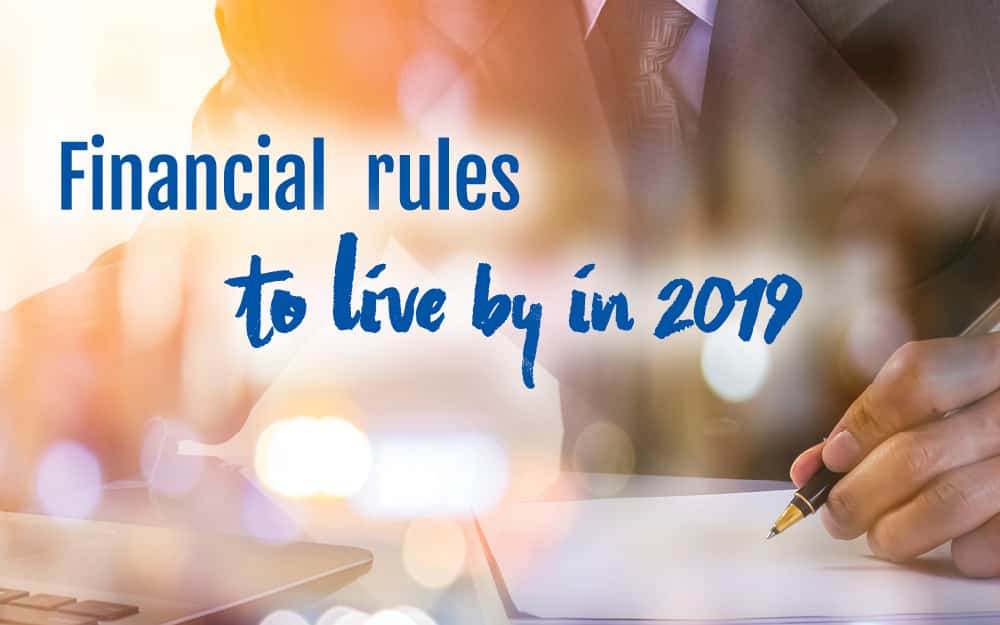Australia has enjoyed almost three decades of economic sunshine. But it’s worth remembering that dark clouds can appear without warning over both individuals and economies.
You may have little control over being caught up in a round of redundancies or experiencing the fallout of an international trade war. But you can choose to manage your finances in a way that lets you keep your head above water come what may.
Financial rule #1: Have an emergency fund
A recent NAB/Centre for Social Impact report found one in seven adult Australians had no savings. One in three were just two missed pay cheques away from serious financial stress.i
The advantages of a rainy-day fund are both practical and psychological. If you do suffer an unexpected setback, you’ll have a financial cushion to fall back on. Plus, knowing you have, say, three months’ worth of living expenses set aside will allow you to make unhurried, rational decisions. (There’s a growing body of research that shows financial stress causes people to behave in short-sighted ways likely to deepen their financial distress.)
Financial rule #2: Get the right insurance
Many Australians who wouldn’t dream of not insuring their home and vehicle are happy to hope for the best when it comes to their income. Surveys suggest only around a third of adult Australians have life insurance, income protection or TPD cover, and many of those are underinsured.ii
If you’re one of that majority of underinsured Australians you may wish to consider the wisdom of insuring your car (which could be replaced for a few thousand dollars) but not doing anything to ensure you – or your dependents, if you’re no longer around – can stay on top of mortgage payments and grocery bills should the income from your job or business disappear.
Financial rule #3: Be smart about debt
While lenders are beginning to tighten their home-lending criteria, there’s never been a time when credit has been so readily available. Technological advances mean this access is only going to become more ‘frictionless’ during 2019.
When it comes to debt, it’s important to understand the difference between the good, the bad and the ugly.
Good debt is used to create wealth, for example, borrowing to buy appreciating assets such as a house or investments. Then there’s acceptable debt, such as getting a car loan so you have the means to get to work. But credit cards, as well as increasingly popular buy-now-pay-later services such as Afterpay and ZipPay, and the short-term online loans offered typically facilitate bad debt, where high-interest credit is used to fund holidays, restaurant meals, clothes shopping and the like.
It’s unrealistic to expect you’ll never splurge using other people’s money but do try to keep it to a minimum, shop around for the best interest rate and repay what you owe as soon as possible.
Financial rule #4: Forge a positive economic partnership
Money issues can be a major cause of tension in relationships if left unspoken. By opening the lines of communication around money you will not only help build harmony but also make it easier to develop and reach shared goals.
You and your better half are unlikely to be at the same point on the saver-spender spectrum, so some conflict is inevitable. Nonetheless, it’s possible to engineer workable compromises around joint finances.
The ‘Yours/Mine/Ours’ method works well for many. It involves each partner getting a set amount of money to do whatever they wish with, allowing them to enjoy some autonomy. The trade-off is that both agree to direct the rest of their disposable income towards reaching mutually agreed goals. For example, paying off the mortgage within five years, making voluntary contributions to super or building a share portfolio.
When it comes to creating economic security for you and your family, small changes in behaviour can make a big difference. If you’d like some help getting your finances in shape for the new year, please call.
i Financial Resilience in Australia 2016, NAB and Centre for Social Impact, p.9,https://www.nab.com.au/content/dam/nabrwd/documents/reports/financial/financial-resilience-report.pdf
ii Life Insurance – Are you underinsured? Canstar, Oct 2016,https://www.canstar.com.au/life-insurance/life-insurance-are-we-underinsured/; Underinsurance in Australia, Finder, https://www.finder.com.au/underinsurance-in-australia





































































